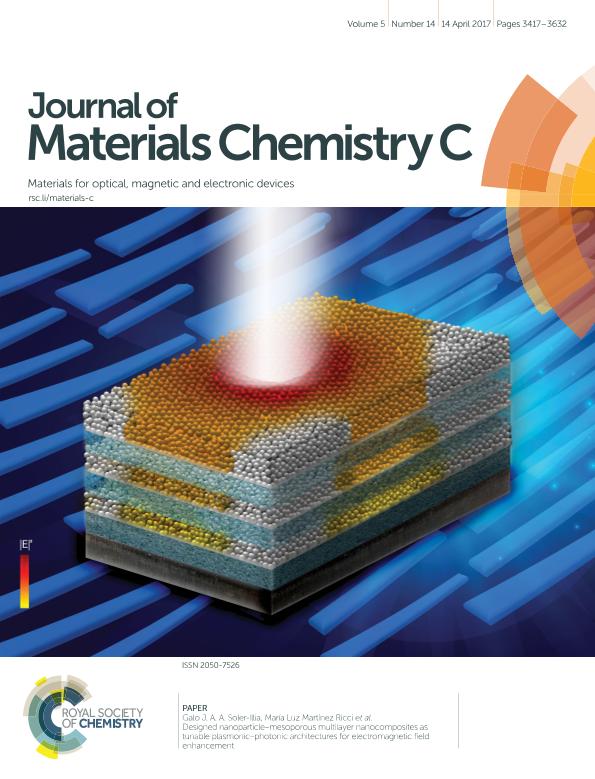Mostrar el registro sencillo del ítem
dc.contributor.author
Martínez Gazoni, Rodrigo
dc.contributor.author
Bellino, Martin Gonzalo

dc.contributor.author
Fuertes, María Cecilia

dc.contributor.author
Giménez, Gustavo
dc.contributor.author
Soler Illia, Galo Juan de Avila Arturo

dc.contributor.author
Martinez Ricci, Maria Luz

dc.date.available
2018-04-04T17:29:55Z
dc.date.issued
2017-04
dc.identifier.citation
Martínez Gazoni, Rodrigo; Bellino, Martin Gonzalo; Fuertes, María Cecilia; Giménez, Gustavo; Soler Illia, Galo Juan de Avila Arturo; et al.; Designed nanoparticle–mesoporous multilayer nanocomposites as tunable plasmonic–photonic architectures for electromagnetic field enhancement; Royal Society of Chemistry; Journal of Materials Chemistry C; 5; 14; 4-2017; 3445-3455
dc.identifier.issn
2050-7534
dc.identifier.uri
http://hdl.handle.net/11336/40729
dc.description.abstract
In this work we present the designed production of a highly tunable nanocomposite able to confine and enhance the electromagnetic field through the combined effects of photonic and plasmonic responses. Silver nanoparticles (NPs) were embedded within a Mesoporous Photonic Crystal (MPC) composed of a mesoporous multilayer presenting a TiO2-SiO2 unit cell. This nanosystem was synthesized by a combination of reproducible sol-gel thin film techniques with the selective production of NPs within the titania layers. The design of the MPC architecture was tuned so that each photonic band gap edge would match the plasmonic absorption peak of the Ag NP, in order to combine their confined plasmonic enhancement with that of the band gap edges due to the multilayer structure. We find that the MPC contributes to enhancing the Surface Enhanced Raman Scattering (SERS) signal of probe molecules trapped in the mesopores. This effect indicates the relevance of the unit cell interfaces for the local electromagnetic field enhancements, and opens the gate to performing plasmon-assisted SERS sensing. The resulting material results in a promising platform to study the interplay between photonic and plasmonic systems. These tuneable nano-architectures are highly robust, reproducible, and can lead to applications in sensing platforms, as well as in optoelectronics, enhanced photocatalysis, or artificial photosynthesis.
dc.format
application/pdf
dc.language.iso
eng
dc.publisher
Royal Society of Chemistry
dc.rights
info:eu-repo/semantics/openAccess
dc.rights.uri
https://creativecommons.org/licenses/by-nc-sa/2.5/ar/
dc.subject
Photonic Crystal
dc.subject
Metal Nanoparticles
dc.subject
Mesoporous Oxides
dc.subject
Sers
dc.subject.classification
Astronomía

dc.subject.classification
Ciencias Físicas

dc.subject.classification
CIENCIAS NATURALES Y EXACTAS

dc.subject.classification
Nano-materiales

dc.subject.classification
Nanotecnología

dc.subject.classification
INGENIERÍAS Y TECNOLOGÍAS

dc.title
Designed nanoparticle–mesoporous multilayer nanocomposites as tunable plasmonic–photonic architectures for electromagnetic field enhancement
dc.type
info:eu-repo/semantics/article
dc.type
info:ar-repo/semantics/artículo
dc.type
info:eu-repo/semantics/publishedVersion
dc.date.updated
2018-04-04T14:13:40Z
dc.journal.volume
5
dc.journal.number
14
dc.journal.pagination
3445-3455
dc.journal.pais
Reino Unido

dc.journal.ciudad
Londres
dc.description.fil
Fil: Martínez Gazoni, Rodrigo. Comisión Nacional de Energía Atómica. Centro Atómico Constituyentes; Argentina
dc.description.fil
Fil: Bellino, Martin Gonzalo. Comisión Nacional de Energía Atómica. Centro Atómico Constituyentes; Argentina. Consejo Nacional de Investigaciones Científicas y Técnicas; Argentina
dc.description.fil
Fil: Fuertes, María Cecilia. Comisión Nacional de Energía Atómica. Centro Atómico Constituyentes; Argentina. Universidad Nacional de San Martín. Instituto Sabato; Argentina. Consejo Nacional de Investigaciones Científicas y Técnicas; Argentina
dc.description.fil
Fil: Giménez, Gustavo. Instituto Nacional de Tecnología Industrial; Argentina
dc.description.fil
Fil: Soler Illia, Galo Juan de Avila Arturo. Universidad de Buenos Aires. Facultad de Ciencias Exactas y Naturales. Departamento de Química Inorgánica, Analítica y Química Física; Argentina. Universidad Nacional de San Martin. Instituto de Nanosistemas; Argentina. Consejo Nacional de Investigaciones Científicas y Técnicas; Argentina
dc.description.fil
Fil: Martinez Ricci, Maria Luz. Consejo Nacional de Investigaciones Científicas y Técnicas. Oficina de Coordinación Administrativa Ciudad Universitaria. Instituto de Química, Física de los Materiales, Medioambiente y Energía. Universidad de Buenos Aires. Facultad de Ciencias Exactas y Naturales. Instituto de Química, Física de los Materiales, Medioambiente y Energía; Argentina
dc.journal.title
Journal of Materials Chemistry C
dc.relation.alternativeid
info:eu-repo/semantics/altIdentifier/doi/http://dx.doi.org/10.1039/c6tc05195b
dc.relation.alternativeid
info:eu-repo/semantics/altIdentifier/url/http://pubs.rsc.org/en/Content/ArticleLanding/2017/TC/C6TC05195B
Archivos asociados
